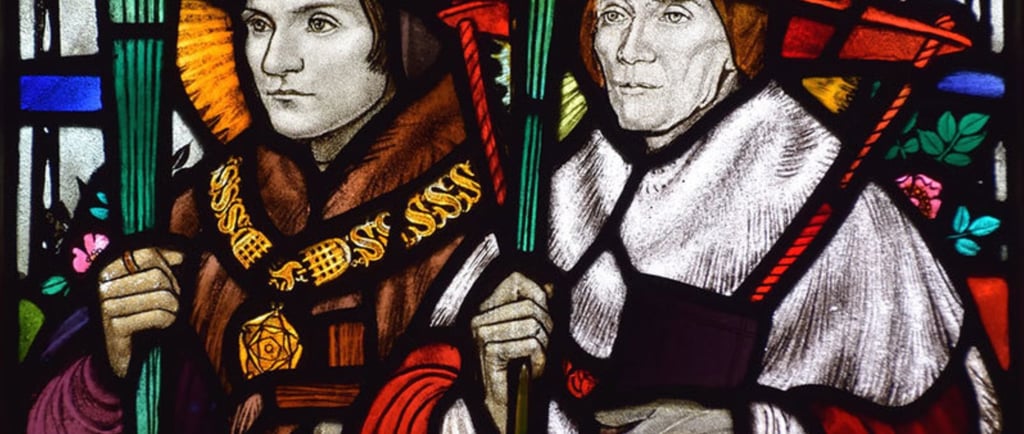The Witness of St. John Fisher and St. Thomas More
The example of St. John Fisher and St. Thomas More urges us to value the Eucharist and the faith as more precious than anything in this world. Their courage can inspire us to stand firm in our beliefs
SAINTS


On this feast we honor Christ’s Eucharistic Body, and we also honor those members of His Mystical Body who witnessed to the faith with their very blood: St. John Fisher and St. Thomas More. These two men, an English bishop and an English statesman, were martyred in 1535 during a crisis of faith in England. Their crime in the eyes of the state was refusing to accept King Henry VIII as the supreme head of the Church in place of the Pope. In truth, their consciences would not allow them to betray the Catholic Church and her teachings. They knew that no king or government can change divine truth. Christ founded the Church and entrusted to it the sacraments; to deny that would be to deny Christ.
St. John Fisher was the only bishop in England who stood firm against the king’s demands. A learned theologian, he had even written books in defense of the Mass and the Real Presence of Christ in the Eucharist when Protestant reformers attacked these doctrines. He once wrote that the Eucharist “is the flame of faith that burns in the heart of Christ’s Church” (a sentiment we can imagine, even if his exact words were expressed in learned Latin). He believed with all his heart that the sacrament of the altar truly is Christ Himself, and he was willing to die rather than participate in a lie that would undermine the faith. After over a year of imprisonment in the Tower of London, suffering cold, hunger, and being denied the Mass, John Fisher was beheaded on Tower Hill. As he prepared for death, the elderly bishop clothed himself in his finest robe. He told the guards that he was going to meet the King of Kings, Christ the Lord, and wanted to dress for the occasion. Such was his faith that death was not defeat but a victorious entry into God’s presence. We remember St. John Fisher today as a model of fidelity unto death – a “good shepherd” who laid down his life for the flock and for the truth.
St. Thomas More was a close contemporary of John Fisher. A married man and father, a brilliant lawyer and Lord Chancellor of England, Thomas More was also a devout Catholic who attended daily Mass and prayed diligently. When the crisis of the king’s divorce and break from Rome arose, More tried quietly to steer his country toward the right, but eventually he too was imprisoned for refusing to sign the oath that contradicted his faith. During his imprisonment, Thomas More wrote heartfelt letters and prayers. One beautiful work he composed is a treatise on the Holy Eucharist, in which he reflected on how we should cherish Christ after receiving Him in Holy Communion. St. Thomas wrote: “Now, when we have received our Lord and have Him inside our body, let us not then leave Him alone… Instead, let all our concern be focused on Him. Let us by devout prayer talk to Him… He is personally present within us… He has done this for no other purpose but to be sought by us”. What a moving description of Jesus as our divine Guest! More realized that after Communion, Jesus dwells in us in a very special way for a time. We shouldn’t rush out or turn our mind away immediately after Mass, but spend a few moments in loving conversation with the Lord who is truly within us at that moment. These words from prison show Thomas More’s deep Eucharistic faith and love.
Ultimately, like John Fisher, Thomas More was condemned to death for his fidelity to Christ and the Church. He approached the scaffold on July 6, 1535, with courage and even humor. He told the bystanders his famous last words: “I die the King’s good servant, and God’s first.” With this statement, he affirmed that he bore no hatred toward his king, but that his first duty was to God’s truth. Both More and Fisher were willing to lose their earthly lives rather than lose eternal life by betraying Christ. Their feast day (June 22) normally falls within the week of Corpus Christi, and how fitting that is! They died for the faith that Jesus is Lord and that His Church speaks the truth about the sacraments. They died as true members of the Body of Christ, faithful to the Head. We can imagine that their strength to persevere came from the grace of the Eucharist they had received so many times before, and from their great love for Jesus present with them spiritually in their final hours.
The example of St. John Fisher and St. Thomas More urges us to value the Eucharist and the faith as more precious than anything in this world. Their courage can inspire us to stand firm in our beliefs and to center our lives on Christ, no matter what trials we face.
Ancient Apostolic Catholic Church
Embracing faith, inclusion, and compassionate service together.
ST THOMAS AQUINAS SEMINARY
© 2025. All rights reserved
QUICK LINKS
